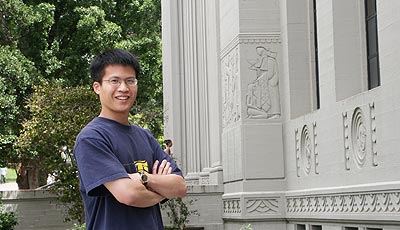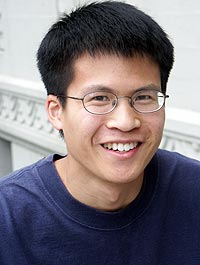UC Berkeley Web Feature
 |
David Young, Molecular and Cell Biology major and a finalist for the University Medal. (BAP photos) |
David Young relies on faith and family to bring his vision to life
BERKELEY – UC Berkeley senior David Young has made the university's motto, "Fiat Lux" ("Let there be light"), a guiding philosophy in his life, with quite visible results. This Molecular and Cell Biology (MCB) major has performed graduate-level neurobiology research that may some day bring vision to the seeing-impaired, founded a software company whose products include a football game playable by blind people, and written plays for church camps to teach children about the Bible.
The University Medal
Finalists: |
Yet when pressed, the soft-spoken Young sidesteps the credit for his many achievements, which include selection as a finalist for the University Medal, Berkeley's highest honor, and membership in Phi Beta Kappa and other honors societies. To Young, his faith as an evangelical Christian and support from his family are the real story behind his successes. "God gives us the power and compassion to accomplish things," he says, "if we can just get out of the way."
Go, Young Bears!
When Young calls UC Berkeley's Valley Life Sciences Building his "home away from home," he means it - up until recently, he could often bump into family members there. Born in San Mateo, he is the latest in a long line of Bears. His parents both went to Cal, as did his two older brothers and older sister. His freshman year, he roomed with his brother Andrew, who has since started dental school.
"As the youngest, I had the advantage of having my siblings' 10 years of experience in making my choices," he says. His older brothers advised him on which science professors to seek out, while his sister, who majored in English, encouraged him in his love of writing.
Young writes in his journal almost daily, explaining that "for me, writing is the process of thinking something through by playing devil's advocate with myself." He also enjoys, and excels at, writing papers - a rare quality in a science major. He won the Music Department's Albert I. Elkus Memorial Prize, for a paper on Louis Armstrong that he says was the "most fun to write in my college career." And in a letter recommending Young for the University Medal, Stephen Goldsmith, a UC Berkeley associate professor of English who taught Young in his Bible as Literature class, wrote that "My only regret about David is he would have made a fine English major . I have met very few students who can learn 'patch clamp techniques to analyze the attachment of a photoswitchable rod in modified ion channels' in the morning, and then write beautiful, penetrating essays on the tension between biblical prophets and kings in the afternoon."
Finding his way
Young began his Berkeley career undecided between majoring in computer science - his longtime hobby - and MCB as a route to medical school. Having always enjoyed working with people, he felt he would make a good physician. But several experiences conspired to nudge him into neurobiology, which he feels is his true calling. First, talking to John Kaeuper, his graduate student instructor for Chem 1A, about Kaeuper's work with lasers opened Young's eyes to the impact that scientific research could have on a vast number of patients. Then, one day on campus Young bumped into Osmond Kwan, the brother of a friend from his church camp, who was enrolled at UC Berkeley.
Kwan is legally blind as a result of deterioration of his retinal ganglia: he can see light, but not objects. Yet walking around the Berkeley campus, Young could barely keep up with Kwan, and he was amazed by Kwan's cheerful equanimity in dealing with his disability. "Osmond is just a normal guy who makes the most of what vision he has," Young says. "I was surprised to find that he navigates the campus even better than I do. What a memory he must have, to be able to memorize all the twists and turns of all those paths."
Kwan awakened Young's latent interest in vision, dating from when he had to get glasses in third grade. Young began working on software programs that made it easier for the visually impaired to deal with large volumes of digitized text, as well as a text-based football game called tXtFL, with which they can choose players and run a play-by-play simulation of a game. In January 2003, he launched Text Flex, a company that makes these programs and others available for free downloading. (Young is a passionate advocate of open-source software, but he admits it poses challenges as a viable business model.)
 'Procrastination is just an embodiment of fear. To overcome it, you have to draw on the spirit within you of power, discipline and love.' -David Young |
He and a few friends run the company in their spare time, which in Young's case is the middle of the night. "My nightlife consists of sitting in my apartment, hacking away at my computer," he admits sheepishly. "I don't need much sleep. I find nooks and crannies during the day to nap, and I'm kind of notorious for falling asleep in large lecture classes." (Somehow it hasn't hurt him; Young has a perfect 4.0 grade point average.)
Young's friendship with Kwan also pointed him in a new academic direction: studying vision on a molecular level through neurobiology. Last year, he began an honor's thesis in the lab of UC Berkeley MCB associate professor Richard Kramer. Young and a Ph.D. student are attempting to use a photoisomerizable molecule to modify an ion channel - the tunnel in certain cells in which charged particles go back and forth, generating electrical impulses such as those used by the brain - so that it can be turned off and on with flashes of laser light. If they succeed, then someday scientists could implant light-activated channels in the retinal neurons to restore vision to people with a certain kind of blindness.
Yet Young says he is too much of a people person to be happy spending all his time in the lab, so in addition to volunteering at a church youth camp, since May 2003 he has offered his time to the Alta Bates Summit Medical Center. For one day a week, he helps hospital staff teach basic skills to children aged 18-36 months with delays in their mental and motor development. "Some of the kids can't communicate, even though it's clear they're trying to; others fall down occasionally when they try to walk; and some can't get a spoon to their mouth," he says. "For me, it's the chance to see how neurobiology plays out in real life, instead of just looking at everything on the molecular level with small proteins and ion channels."
Like another of his older brothers, Arthur, Young intends to marry his facility with research with his desire to help people in the flesh by pursuing a joint M.D./Ph.D. degree. He has already been accepted to M.D./Ph.D. programs at Columbia, UC San Francisco, and Johns Hopkins. "The idea of getting to do both research and clinical work is great, because you actually get to see the fruits of your research in people," he says. Somehow, it's nice to hear that Young is not entirely selfless - he certainly deserves to witness the moment his patients see the light.


 University
Medalist Margaret Ann-Chia Chow urges new students
to make campus "feel like home"
University
Medalist Margaret Ann-Chia Chow urges new students
to make campus "feel like home" Leadership
depends on dialogue, says ex-ASUC president Jesse
Gabriel
Leadership
depends on dialogue, says ex-ASUC president Jesse
Gabriel From
Istanbul to Berkeley, Perin Gurel is on the
lookout for new challenges
From
Istanbul to Berkeley, Perin Gurel is on the
lookout for new challenges David
Young relies on faith and family to bring
his vision to life
David
Young relies on faith and family to bring
his vision to life Would-be
physician Maria Garcia gives back to the
Latin-American community
Would-be
physician Maria Garcia gives back to the
Latin-American community After
changing her major and her mind, Deann Del Rio
takes on modern medicine
After
changing her major and her mind, Deann Del Rio
takes on modern medicine